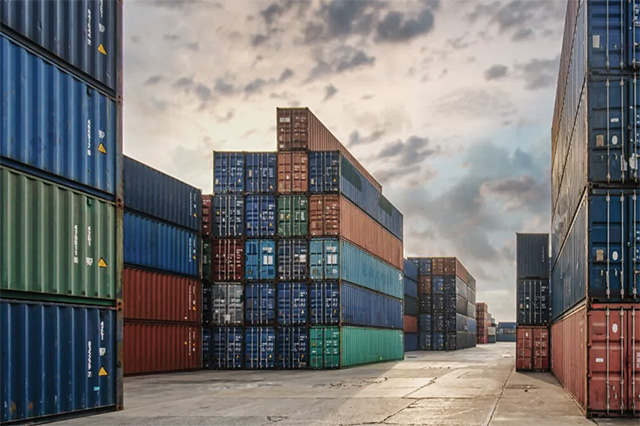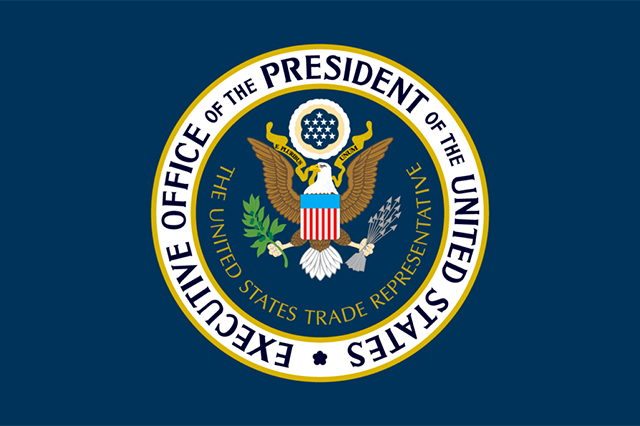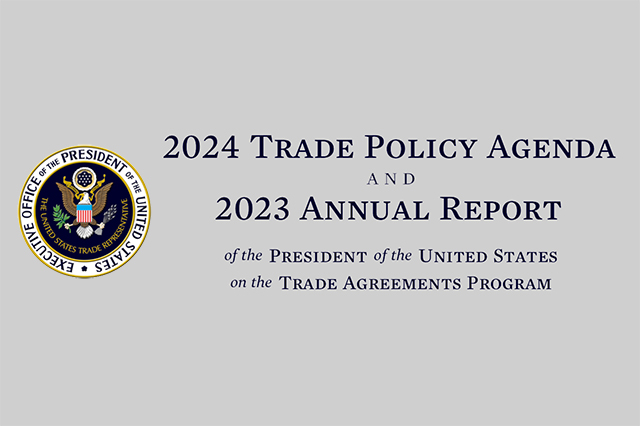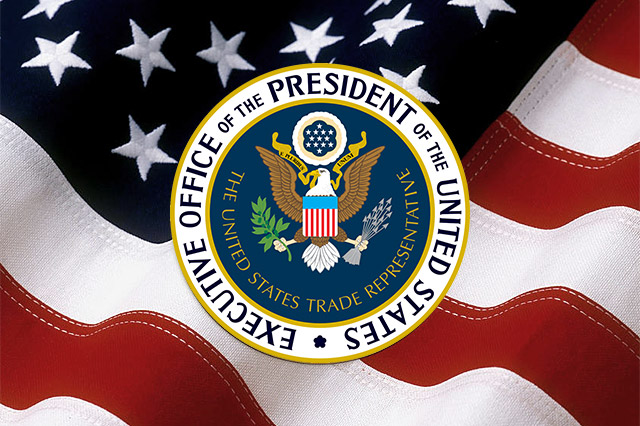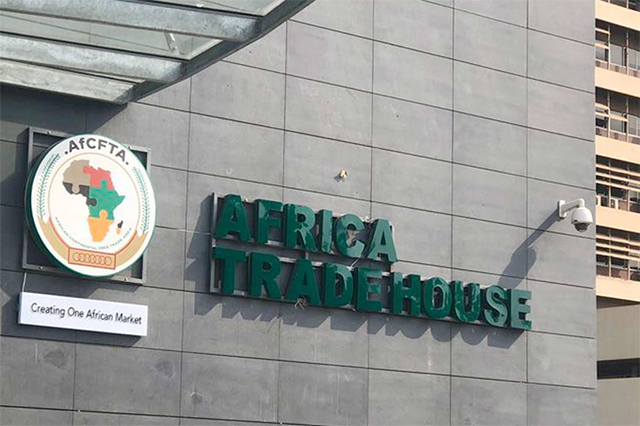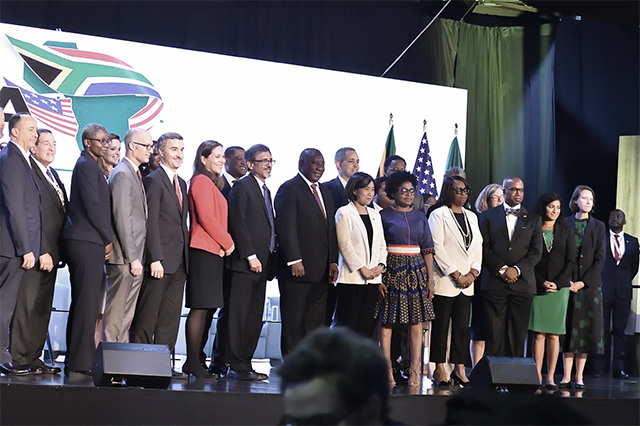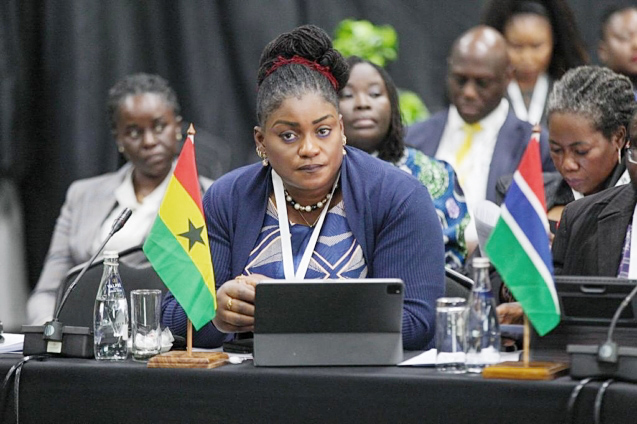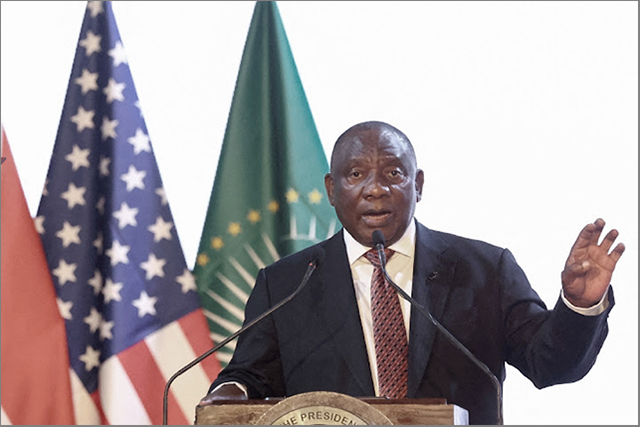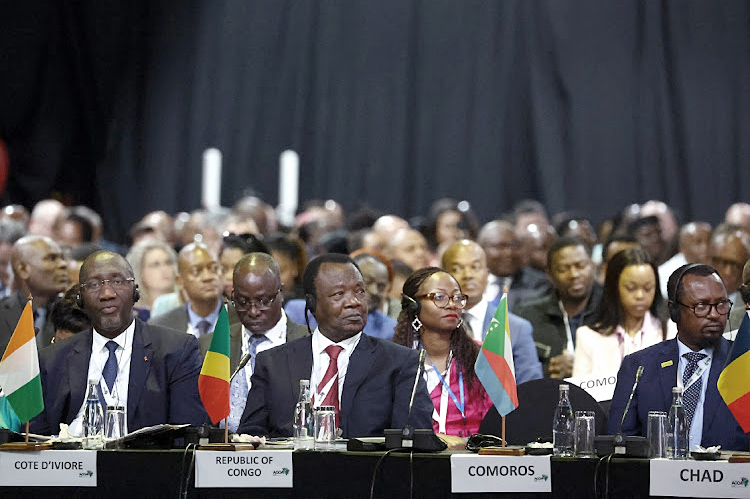AGOA Forum 2023: Digital press briefing with officials in the USTR and State Department [Transcript]
MODERATOR: All right. Good afternoon to everyone from the U.S. Department of State’s Africa Regional Media Hub.
I welcome our participants logging in from across the continent and thank all of you for joining this discussion. Today, we are very pleased to be joined by the Assistant U.S. Trade Representative for Africa Constance Hamilton and Deputy Assistant Secretary in the Bureau of African Affairs of the State Department Joy Basu.
Our speakers will be discussing the importance of the U.S.-Africa economic ties to the U.S. Strategy Toward Sub-Saharan Africa, and the upcoming African Growth and Opportunity Act, or AGOA, Forum, which will be taking place next week here in Johannesburg, South Africa. Our speakers are joining us from Washington, D.C.
We will begin today’s briefing with opening remarks from our speakers, then we will turn to your questions. We will try to get to as many of them as we can during the briefing.
As a reminder, today’s call is on the record, and with that, I will turn it over to Assistant USTR Hamilton and Deputy Assistant Secretary Basu. Whichever one of you would like to give opening remarks first, please proceed.
Download a recording of the press briefing at this LINK.
MS HAMILTON: Joy, over to you.
MS BASU: Happy to, and good afternoon, everyone. Thank you so much for taking the time to have this conversation. I’m very excited to be here with you and to have our question-and-answer time. I’m here to basically emphasize that fostering new economic engagement is a top – with countries in Africa is a top priority for President Biden and for the U.S. Government. It’s this idea of a shared, inclusive, sustainable economic growth in Africa that is at the front of our goals as an administration and was really highlighted at last year’s U.S.-Africa Leaders Summit in December.
The African Growth Opportunity Act, AGOA, is a cornerstone of the United States’ economic engagement program with Africa, and it’s something that we’re very proud of. This year’s AGOA Forum, and which will be next year in South Africa – next weekend in South Africa, builds on this commitment that we emphasized at the U.S.-Africa Leaders Summit to really build stronger economic engagement with multiple partners across the continent of Africa.
At next week’s forum, we hope for a constructive and thoughtful dialogue about what is working well in AGOA and what can be improved and what its strategic and impactful value is. We’re looking forward to this conversation, obviously, with our government partners but also with the private sector – with businesses, with trade unions, and with other civil society actors that are critical to this economic ecosystem in which we’re all working.
I would also say that timely authorization of AGOA is a goal of the Biden-Harris administration and an opportunity to change it for the better. That being said, obviously Congress writes the laws, and so we are here to support them however they need as they consider that choice. But I’d also emphasize that the AGOA program is about more than just trade; it’s really a strong opportunity for diplomatic engagement. And as you all know well, AGOA also supports policies to reduce poverty, to combat corruption, to protect human rights and worker rights, and we see all of that as a collectively reinforcing mechanism to strong economic growth, is the good rule of law. And so we hope that those can continue to work together to create the opportunities that we know we need for many, many young Africans to bring their talents and their goods and services to the world.
So I’ll stop there and hand it over to my colleague, and look forward to your questions. Thank you again for being here.
MS HAMILTON: Okay. Thank you, Joy. Not much to add to that except to remind folks that when AGOA was enacted in 2000, we hoped that it would be really a game changer for the continent in terms of our relationship with individual countries and with the ability to support regional integration across the continent. And so we’re looking forward to the AGOA Forum as a mechanism by which our leadership can talk to their counterparts and really engage on the issues that impact our relationship. We know that a number of countries get into AGOA, a number of countries get out of AGOA. These are all questions that we have to talk about – about what’s important, what are we looking for, how can the program be more impactful.
After almost 25 years, we know that very few countries are actually taking advantage of this program, and that the sectors that are open and available, very few of those are actually being utilized.
So the question I think that’s going to drive the conversation at the AGOA Forum in Johannesburg in just a few days is how do we improve on this program. We’re very pleased that we’ll have some participation from our friends in Congress, who actually, as Joy mentioned, hold the pen on AGOA. One hundred percent, they are the ones who will – if the law is going to be revised, if any changes are going to be made, if it’s going to be extended, all of that is up to our Congress. And so it’s very important that they hear from the ministers, the private sector, and civil society, their ideas about what can be done to make the program more impactful.
So let me stop there and just say that we are – we at USTR are truly looking forward to this engagement and we’re looking forward to having some robust conversations about trade and investment policy going forward. So let me stop there. Thank you.
MODERATOR: All right. Thank you very much to both of our speakers. And I see that some of our journalists have already begun to identify themselves in the webinar chat and Q&A and inputted their names and affiliations as well, so thank you very much for doing that.
So I wanted to make note of the fact that at our U.S. Embassy in Luanda, Angola, they have gathered together a group of Angolan journalists just for this press conference, and so I wanted to make sure we give an opportunity to some of their journalists to get their questions in. I do have a question from Ernesto Jaime of PlatinaLine in Angola, and the question is: “It is known that commercial exchange between Angola and the United States is dominated by crude oil, diamonds, and gas. It was only recently that the first export of food products began through the AGOA project. Within the scope of exports, what is the plan to look at other sectors in which Angola has potential?”
MS BASU: I’m happy to take a first attempt at that, and then, Connie, would welcome your additions. So thank you so much for the question and thank you all for being there together in Luanda.
As you rightfully acknowledge, there are so many sectors that are available for export through AGOA, and traditionally in some countries it is more of these extractives like oil that has been well utilized. We would really encourage the government and civil society to work together to create more plans for how AGOA can be better utilized in Luanda.
Obviously, there is tremendous potential across – even, for example, just agricultural products that I know are grown in Angola. But one of the key factors to raising utilization is having a strategic plan for how a government will work with private sector to utilize that. And so we’re really eager to see more – that trade diversified. And I would also say that we have a fantastic ambassador in Angola, Ambassador Mushingi, who really knows the value of economic growth and that is one of his top priorities in the country. And so thank you for the question.
My short answer would be for government and civil society to work together to create a utilization plan, and we’re working through the State Department, with USAID, with USTR, and with our Prosper Africa initiative to create more trade hubs and workshops to help educate different small businesses on how to actually utilize AGOA better. I hope that answers the question, and I’ll turn to Connie if there’s anything she would add.
MS HAMILTON: Yeah, one of the most important things about using the program – because we have noticed that for those countries that have actually been very proactively reaching out to their private sector, to their entrepreneurs, to their farmers and making sure that they understand how the program works is one of the keys to whether or not their businesspeople and their entrepreneurs are going to be able to use the program.
The other thing that I would say is that value addition and actually adding value to primary goods – so, for example, the cashews that are being produced int West Africa, how do we process those cashews in the continent as opposed to exporting them to another country that does all the processing? How do we encourage the vertical – the development of a vertically integrated textile industry so that all the inputs that are going into the apparel right now that are being produced in Lesotho and other countries are basically coming from Asia? How do we put that production on the continent? So one of the things I hope that we’ll start talking about at this year’s forum is how do we improve value addition, how do we make sure that the supply chains are sustainable, how do we make sure that all of the countries – that the economic drivers on the continent, the bigger economies, are pulling in the smaller economies to provide inputs for what they’re producing? And I think those are the kinds of conversations we want to have with the ministers on the continent.
MS BASU: I will jump in one more time just to give a shoutout. Last week, I was in Benin, and on Tuesday I got to go visit a cashew processing factory, where it was really inspiring and exciting to see the raw cashews that were coming from the north, fully processed, through this factory in Benin in their free trade area, and at the end being placed in 50-pound briquettes basically for export to the U.S. And as Connie said, that’s one small example that we’d like to see expanded. But the cashew story in particular was one I saw firsthand last week and would like to see more of across the continent.
MODERATOR: All right. Thanks very much for those answers. So next I see that Julian Pecquet of the Africa Report has his hand up. So Julian, if you would like to ask a question, your mike is open. Ask a question.
QUESTION: Great. Thank you so much. Can you hear me?
MODERATOR: Yes.
MS HAMILTON: You’re very soft on mine.
QUESTION: I have —
MS HAMILTON: I can’t really hear him, but it may be my computer. Let me try something.
MS BASU: He is soft, Connie. Julian, just so you know, you’re quite soft.
MS HAMILTON: Okay.
QUESTION: Oh, okay. Hold on. Shoot. Can I – I’ll speak louder. Can you hear me okay?
MS HAMILTON: That’s better.
QUESTION: Okay. Thanks. I have three questions, but I’ll keep them really short. One is Ethiopia has been lobbying a lot to get back in the program. Do you expect an announcement on that at the forum? I’m not asking you to preview what that announcement might be but just whether we’ll find out next week if they’re back in.
You talked about regional integration. And as you know, AGOA does not cover North Africa, but with the AfCFTA, obviously, this is becoming a bigger and bigger issue. So do we expect any talk at the forum about how to maybe have inputs from North Africa into the rest of Africa sort of be allowed under AGOA or any other formulation along those lines?
And then finally on minerals, as you know, African countries have been worried about the law – the investment law and the Inflation Reduction Act, trying to figure out how they could be allowed to benefit from it. I was wondering if – is there any interest at all in using AGOA as the basis for negotiating a critical minerals agreement similar, for example, to the one that is going on with Japan? Thank you.
MS HAMILTON: If I can just quickly, and then, Joy, turn it over to you.
On the question of Ethiopia’s AGOA eligibility, those decisions are still pending. So no, there probably will not be an announcement at the time that we get to the AGOA Forum.
In terms of the regional integration of North Africa into AGOA, that’s an interesting point, and I’m glad you raised it, because this is something, I think, that we should study. I’m not sure that Northern African countries should be part of AGOA, but certainly we should think about how we can integrate them into the supply chains and the value chains in Sub-Saharan Africa given the AfCFTA. Since the country – the continent is moving towards this regional integration, I do think that – and I hope that Congress will look at and think about a way to maybe incorporate that in the next iteration of AGOA.
In terms of the critical minerals issue and whether or not that will – that AGOA will address that on some way, again, Congress holds the pen on what’s going to happen going forward. It’s hard to predict what they’re going to try to do with that, but I – it’s a very good question, and I think it’s something that they should think about.
But over to you, Joy.
MS BASU: No, that’s perfect. And I would just say that, Julian, we’re very supportive of the AfCFTA, and we hope that AGOA can be complementary to it, to the – that question.
To the second two, I would say I hope that everything is on the table to talk about next week at the forum – all kinds of ideas to increase utilization and increase the impact of AGOA, whether that is discussing how critical minerals can be integrated into the IMA, IRA, with a CMA – a critical minerals agreement – whether that is talking about the opportunities for synchronizing with Northern Africa. And again, as Connie said, of course, Congress holds the pen. And so I hope next week is an opportunity to really have these discussions, to bring the data, and to discover together – kind of present ideas of what would be the most impactful for our colleagues in Congress to see and to consider and to incorporate into their decisions about the legislation.
MODERATOR: Okay. Thanks for those answers. As a reminder to the journalists, I think the questions that are the most productive for this discussion are the ones that focus on the upcoming AGOA Forum, since that’s the driving event for what we’re – the reason why we’re doing this press conference today. And also, as the assistant USTR mentioned, we’re not going to be in a position to preview or predict any of the finding – eligibility findings that will be announced closer to the date of the forum. So you know, please bear that in mind as you ask your questions.
We have a submitted question from SABC Channel Africa right here in South Africa from Thamo Kapisa who asks: “Is there any intention going forward of shifting AGOA principles from trade to development, as most countries in Africa are underdeveloped and this can sometimes be a hindrance to trade?”
MS HAMILTON: I mean, the whole point behind AGOA is to push development, so I think it already does that. I think the question is how can we make it more effective, and that’s the conversation that we’re having now and the conversation that we will have at the forum. But Joy, if you want to add to that?
MS BASU: No, I fully agree that the whole goal of AGOA is to use trade to spur development. And I think one of the challenges is exactly what our journalist points out, that until countries have more things to actually produce in trade it is hard to make the most of AGOA. And so that’s what we need to talk about is both how do we make more products that are produced eligible and make people aware of those opportunities – as Connie mentioned at the top of the program – but also how do we think about spurring more development in order to take advantage of those opportunities. But this is, at its core, a development program, and trade is an important element of that. Thank you.
MODERATOR: Okay. That makes great sense. Thank you very much. So I see in the – we have another journalist with their hand up, someone we heard from in preparation for the forum, Mona Davids from LittleAfrica News. So Mona, would you like to ask your question?
QUESTION: Yes. Hi. Good afternoon. Can you hear me?
MS HAMILTON: Yes.
QUESTION: Okay. Wonderful. Okay, so my question is to twofold. One is: Which lawmakers, which congresspeople are attending the AGOA Forum, and are they leading business delegations from their respective states? And then my second question is: With the African diaspora in the U.S., what type of outreach was done to engage, educate, inform African diaspora business owners, potential buyers, and investors about the AGOA Forum? Thank you.
MS HAMILTON: I don’t know. Joy, do you want to start and I can fill in? Or —
MS BASU: Happy to. So at a high level, we are expecting a delegation from the Ways and Means Committee, the House Ways and Means Committee. I’m not sure of the exact representatives anymore, because as you know, there have been a few changes in our Congress over the last week. And so we are excited to welcome and to partner with our representatives who do come. Connie may know more about the specifics. And I would ask – I would direct those questions to Congress as to who will actually be there from their representatives and their staff members.
To the second question about the diaspora, I think it’s a really great point. Two things I would say. One, we have been really working through our buyer supplier networks and through our trade hubs to really emphasize those diaspora businesses, because as you rightfully point out, it’s an incredible opportunity. The African diaspora in the United States is vibrant, it’s diverse, and it is one of the deep people-to-people connections that the United States has with countries in Africa and one that we would like to elevate. And so as you rightfully point out, it’s an opportunity to really strengthen AGOA through those businesses, many of which are food products or beauty care products. And when I was in Nigeria last week, I’m met with a group of women entrepreneurs, many of whom have diaspora ties, to talk about how they can better utilize AGOA.
Two – yeah, so let me hand it back over to Connie with one more comment, which is on Monday the President will be launching his President’s Advisory Council on the African Diaspora in the United States, and it’s called the PAC ADE, and it’s one of the many efforts to really strengthen the U.S.-Africa diaspora ties that we announced at the U.S.-Africa Leaders Summit last December. So please stay tuned for that as an opportunity both for AGOA and beyond.
MS HAMILTON: And just to add on that, in terms of the congressional representation, we are expecting a number of representatives and staff to attend the forum. As Joy noted, things are changing very rapidly on the Hill. That could change, so it’s difficult to say who exactly is coming in until they actually land because I do know many things are up in the air on that.
In terms of our outreach to not just the diaspora but to our private sector, civil society, all those stakeholders are interested in what we do, that’s part of what we do almost every day. Making sure that we connect with folks who are really impacted the most by what we do is really important to making sure that our policies and objectives and goals are going in the right direction. So I would say that, in addition to this conversation that we’re having with you, we’ve had some meetings with our advisory committee groups, with the private sector, with civil society, just to talk about the forum and make sure that they are aware what the plans are, what the theme is, how they can participate. We are working very closely with our friends in South Africa as they’re putting together all of the details. And I understand they are working, like, around the clock to make sure that we all have an excellent forum. So yeah, the diaspora is very important, and we are certainly reaching out to make sure that they understand what the opportunities are in Johannesburg in just a few days.
MS BASU: One program that is really close – I’ll speak to – for Connie on this one, if I may – to both of our hearts is the AWEP program, the African Women’s Entrepreneurship Program. And that is one where we’ve had – we’ve been making a really deliberate effort to bring people who participate in that program from around the continent to South Africa next week, and we’re excited for their participation.
MODERATOR: All right, fantastic. So we have a journalist from Kenya, Luke Anami, who’s from Nation Media Group, and he’s given us a couple questions in advance, and also in the Q&A. So Luke asks: “A major question that has remained unanswered is whether AGOA is being extended.” I think our speakers have spoken to that. “What is the lesson from the 25 years of AGOA?” Interesting for – interesting question for our speakers. And then he also asks: “The U.S. is negotiating a bilateral trade agreement with Kenya, the STIP, U.S.-Kenya STIP. Will this replace AGOA, and what plans does the U.S. have for the rest of Africa?” I think the question is how does a bilateral trade deal like that with Kenya interface with the AGOA program.
MS HAMILTON: If I can just start on this one, the first thing, the lessons learned from 25 years of AGOA, is that we have to do better. I think that the U.S. International Trade Commission just finished a study, at the request of Congress, to look at AGOA implementation, and it’s a very thick study. I – it’s available online; I recommend that you look at it. But one conclusion that they made is that AGOA has not met the expectations we had in 2000, and so while they’re not saying that the program hasn’t been useful, because some countries have benefitted greatly from AGOA, but the majority have not. And so we know that we still have a lot of work to do.
And that’s one reason why, when we look at renewal this time – and I know that, especially like from the African diplomatic corps and others who are concerned about if Congress starts tweaking the language, it would take too long and the program might actually expire. But we do believe that not addressing and not trying to change the program and make it better is a wasted opportunity. So at USTR we do support renewal of AGOA, but we do think that there are things that can be done to make the program more impactful, and we hope that Congress will take a look at those things.
In terms of Kenya – and as the lead negotiator on the STIP, I can tell you that I was very pleased when Kenya raised their hand and said that they wanted to take this new step in terms of the relationship with the United States. It does not replace AGOA at this point. Kenya – we’re not talking about graduating Kenya out of AGOA. The STIP is actually a way of – Kenya will undertake, and we – together we’ll undertake additional commitments that we believe will improve Kenya’s investment climate and environment, and that at the end of the day Kenya will be in a better place to attract the kind of investment for the kind of job growth that they’re looking for.
We do believe in the future that what we’re doing with Kenya could be a model for other countries. When we launched this under the previous administration and under the current administration, the guidance we got is that it has to work. So what we do has to work for Kenya before we say that this is something that we will replicate someplace else. We have to make sure we get it right. But I’m very excited about the progress that we’re making. I think we’re looking forward to having another round of negotiations in December with Kenya, and I’m hoping that at the end of the day we do have a model that we can replicate in other interested countries across the continent.
MODERATOR: All right. Thank you very much. So we are coming close to the end of our time. Our speakers have been very generous with their time today, but I think we can hope to get in one or two more questions, if they’re fairly brief. I see that John Eligon of The New York Times has his hand up, so John, if you’d like to ask your question live.
QUESTION: Hi. Yes, thank you. My question is: In what ways do you all believe that AGOA sets the U.S. apart from other countries that are doing trade and business in Africa? And how important is it to the U.S. national interest and its economic foothold on the continent that it does set itself apart from other nations? And then just one other thing regarding the forum specifically: Why did you all decide to hold the forum in South Africa, despite the concerns raised by members of Congress in the letter that they sent to the administration?
MS HAMILTON: If I can just take the last question first, and then Joy, you can – the decision to have – hold the forum in South Africa was made at the end of the last forum, and I’m talking about the last forum that we had in Africa, not the mini ministerial that we did as part of the Leaders Summit. And so its addition – the African countries get together and they decide which country would like to volunteer to host, and South Africa volunteered to host. That’s why we’re going to South Africa. We agreed, and that’s why we’re going, and we’re looking forward to it.
Joy, is there anything you wanted to add to that?
MS BASU: No, I appreciate that. And thank you for the question, John. I would say to your first – to the first question, I do think it’s really important that AGOA sets – is set apart from other countries, because it does have these other conditions around workers’ rights and human rights and democracy, and I think that’s important for two reasons.
One, we know the evidence shows that those are mutually reinforcing, that the right enabling environment for all people is what enables companies to have a certain amount of predictability, to have a certain amount of skilling, and to really raise standards across income levels and across industries. But second, we think it’s really important for inclusive economic growth, and that is what the goal of AGOA is, and at least the United States interest. I can’t speak for other countries interests, but we really are trying to create economic growth through this program that upskills the people and leaves the communities better from a human rights and worker rights and participation perspective, and we think those two go hand in hand.
I know that’s not the case for all other trade agreements or all other countries’ approaches to economic engagement with Africa, but that inclusive, sustainable, people-centered growth is still something that we would like to elevate and something that AGOA stands for. Thank you.
MODERATOR: Okay. So with the forbearance of the speakers, I think I can push my luck and maybe get away with one more question because this is such an interesting discussion. The questions are coming in fast and furious, and we’ve got a great turnout of journalist attendees today. I’d like to make sure that we get in at least one from the Francophone press in Africa, and so there is a question submitted by Radio – Andriamampandry in Madagascar, and we have an English translation of that question: “What will be the main topics that will be covered during this forum? And will the post-electoral context and the elections in some African countries such as Madagascar be on the agenda?”
MS HAMILTON: I’m not sure I understand the second question. I’m sorry, would you repeat that please, Johann? I’m sorry. The second part of the question.
MODERATOR: Will the – I think the question is about the impact of some upcoming elections in African countries, including Madagascar, whether that will be a subject of discussion during the forum. And those of us working on the ground here, we’ve seen that the forum will be treating a number of very interesting topics, so that was the first part, sort of what will be covered.
MS HAMILTON: I wish I had with me the agenda, because I would actually read off to you the topics that we’re going to be covering at the forum. I don’t know, Joy, if you have that with you.
MS BASU: I actually don’t have it in front of me. It’s a great question, though, on —
MS HAMILTON: It’s a great question. And I’m sorry I don’t have it. However, I do believe that the agenda will be available online, and I encourage you journalists to take a look at that. I apologize for not having it in front of me. I would like to give you a list of the topics.
I can tell you that in addition to all the breakout sessions where we have, like, there’s a congressional session, Ambassador Tai is going to chair a session. We call it the ministers-only meeting, where they sit down and they talk through all the difficult trade and investment questions and issues that are on the minds of her counterparts. And it has everything to do with the prevalence of undemocratic changes of government in some West African countries, and what impact that has on the rest of the continent. It has to do with how do we create a more inclusive and sustainable program that brings everyone under the tent of trade benefits, so not just the people at the top are benefitting but the farmers, as Joy mentioned, the women entrepreneurs, the youth – that everyone gets pulled under that umbrella.
So those are all the kinds of topics we’re going to be talking about, all of which leads to how do we make AGOA more impactful so that it does benefit the people that we intended back in 2000 when President Clinton signed this thing into law, and all the iterations of it that have happened since then, and all the changes and the progress that we’ve made; how do we build on that.
But over to you, Joy.
MS BASU: No, that’s perfect. And I would just add two things: that, as you might imagine, especially this year, the supporting of democracy on the continent is a huge focus for the administration and for our bureau in particular. And we remain committed to supporting electoral processes that really deepen democracy across the continent, including in Madagascar. And in that context, I would say we continue to encourage electoral bodies to increase citizens’ understanding of the political process, and to really ensure that not only are there free and fair elections, but that there is felt perception in the population of free and fair elections when it comes to democracy. And so that is relevant in many countries; it’s really a policy focus area of ours as we partner with governments and civil society and other institutions in the continent, including in Madagascar.
And to Connie’s point about improvement, that really – and utilizing the impact and increasing the impact of AGOA, I would just say that that is what we are thinking about a lot as we go into next week, and what is the data, what are the opportunities, and how do we really hear from our partners on the ground about what else they need – both from our side, to help increase utilization in the way that the law currently stands, so how can we use our development support and our workshops and our training better under the current law; but also what should Congress be hearing about any modernization and improvement that the law could use as they consider reauthorization in 2025.
So it’s a great question. Please look to the website soon about the agenda. And the last thing I’d say about the agenda is yes, there’s the formal program that we do with the government, but there’s also a lot that happens at the forum on the sidelines of that. And many private sector events and many civil society events. And so the heart of diplomacy is talking, and I’m hoping that all these topics come up, and that nothing is really off the table when it comes to discussing and engaging.
MS HAMILTON: Good answer, Joy.
MODERATOR: All right, thank you very much. Oh, pardon me.
MS HAMILTON: I said, “Good answer, Joy.”
MODERATOR: (Laughter.) It was, definitely. And I apologize, I also don’t have a copy of the agenda directly in front of me. I will note, as Deputy Assistant Secretary Basu noted, that there’s a civil society forum on the agenda; there’s also an organized labor forum on the agenda. It’ll be the first time that worker rights have a prominent role in AGOA Forum-related discussions. So it will be a comprehensive program of three days right here in South Africa, and we’re all really looking forward to it.
So thanks for all those great questions, everybody. I think we got to all of the major issue areas; at least if we didn’t get to all the questions, we got to all the major issue areas. There was lots of interest and lots of questions about AGOA eligibility determinations and about the extension process, and also about how AGOA works toward economic integration on the continent. So I think it was a really great and productive discussion today.
I wanted to give a chance to our speakers, if they have any final remarks that they would like to share with us.
MS HAMILTON: I would just say thank you for the opportunity to talk to you. Thank you for the wonderful questions. When you probe us, that makes us think about better ways to do the jobs that we’re doing. So thank you very much for being here today. I look forward to seeing some of you, I hope, in Johannesburg in a few days. So thank you.
MS BASU: I only want to emphasize that and just say that it is these discussions that are at the heart of free democracy, to our – our last question. And so thank you for them, and keep them coming. Please stay engaged with us, with your African governments. And it is – we’re all in this together when it comes to these goals, and so the press is a critical part of that in the United States and in Africa. And so thank you for the good work you do and your partnership towards this vision that we share.
MODERATOR: All right. Thank you very much. So that concludes today’s briefing. I want to thank Assistant U.S. Trade Representative for Africa Constance Hamilton and Deputy Assistant Secretary of State, Bureau of African Affairs, Joy Basu for joining us, and thank all the journalists as well.
As always, a recording and transcript of today’s briefing will be distributed to participating journalists as soon as we can produce them. If you have any questions about today’s briefing – and also just please stay in touch with us – contact us at This email address is being protected from spambots. You need JavaScript enabled to view it.. I would also like to invite everyone to follow us on Twitter at our handle, @AfricaMediaHub.
Thank you very much, everyone.
MS HAMILTON: Bye, everyone. Thank you.
See a related video featuring a discussion with SABC Washington correspondent, Nick Harper.


![AGOA Forum 2023: Digital press briefing with officials in the USTR and State Department [Transcript] AGOA Forum 2023: Digital press briefing with officials in the USTR and State Department [Transcript]](https://agoa.info/images/articles/16344/_thumb2/ustr-blue.jpg)

